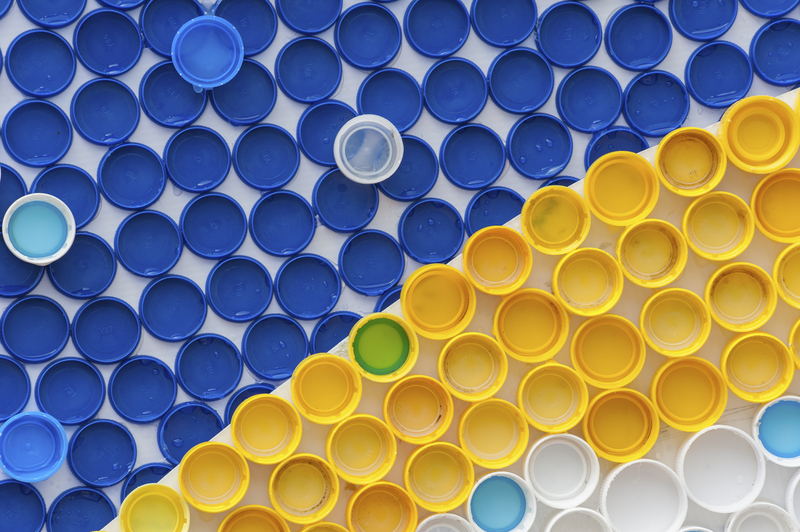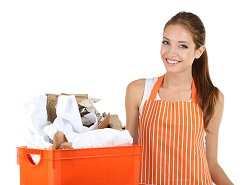Declutter Your Kitchen: Proper Recycling for Pots and Pans
Posted on 23/08/2025
Declutter Your Kitchen: Proper Recycling for Pots and Pans
Is your kitchen overflowing with old cookware you no longer use? If so, you're not alone. Many households accumulate stacks of unwanted pots and pans, unsure of what to do with them. Fear not - we've compiled everything you need to know about recycling old pots and pans responsibly, helping you clear the clutter and contribute to a more sustainable planet.

Why It's Important to Recycle Cookware Properly
Most pots and pans are made from valuable materials like aluminum, stainless steel, or copper. Simply tossing them in the trash wastes resources, fills landfills, and hinders environmental sustainability. Recycling cookware gives these materials new life, reduces demand for virgin resources, and supports eco-friendly habits.
- Save space - Remove clutter from your kitchen.
- Protect the environment - Prevent landfill waste and pollution.
- Support circular economy - Help valuable metals get reused.
Can Pots and Pans Be Recycled?
Yes, but with some caveats. Most local recycling programs don't accept pots and pans in roadside bins, primarily because of their size, weight, and mix of materials. Instead, special recycling facilities are more equipped to handle cookware. Sometimes, scrap metal yards also accept these items. Recycling pots and pans the right way requires a bit of extra effort-- but it's worth it.
Types of Pots and Pans and Their Recyclability
Not all cookware is created equally. Understanding what your pots and pans are made of is the first step to proper recycling.
Aluminum Cookware
Aluminum pans conduct heat well and are often light. This metal is highly recyclable. Even anodized or nonstick-coated pans can sometimes be accepted-- just check with your local scrap metal facility.
Stainless Steel Pots and Pans
Stainless steel is durable, resistant to corrosion, and universally recyclable. Most stainless steel cookware contains nickel and chromium, adding extra value for recyclers.
Copper Cookware
Copper pots and pans are prized for their heat conductivity and are highly sought after in scrap markets. The only challenge is separating the copper from other materials (handles, linings) when recycling.
Nonstick and Ceramic-Coated Cookware
Items coated with Teflon, ceramic, or other nonstick surfaces are more challenging to recycle. Some facilities won't take them, but others will, as long as handles and non-metal parts are removed first. Check with your local recycling provider or scrap yard.
Cast Iron Cookware
Cast iron pans last for generations. If yours is damaged beyond repair, scrap metal yards will almost always accept them. Just make sure there are no other attached materials.
Signs It's Time to Let Go of Old Pots and Pans
- Warping - If the bottom is uneven, it won't heat evenly.
- Severely scratched nonstick coating - Ingesting flakes or chemicals is a health risk.
- Loose, broken, or melted handles - These can cause accidents or injuries.
- Persistent rust or corrosion - Especially for cast iron and steel items.
- Discoloration you can't clean away - This can affect food flavor and safety.
If you recognize these issues, it's time to say goodbye - and recycle!
How to Recycle Pots and Pans the Right Way
Ready to declutter your kitchen? Follow these step-by-step tips for proper recycling of pots and pans:
1. Assess Material Type
- Is it all metal? Pure aluminum, copper, cast iron, or stainless steel are easiest to recycle.
- Is it coated? Check for nonstick, ceramic, or enamel coatings. Some facilities may not accept coated cookware.
- Are there non-metal parts? Remove plastic, rubber, or wood handles, knobs, and lids whenever possible.
2. Contact Recycling Facilities
Find your nearest scrap metal recycler, municipal recycling drop-off, or hazardous waste facility. Use online resources like Earth911 to locate facilities nearby. Call ahead to confirm if they accept your cookware's specific material.
3. Prepare for Drop-Off
- Remove all non-metal parts, like handles and glass lids.
- Clean your pans. Remove food residue for easier processing at the facility.
- Bundle similar materials together to streamline the recycling process.
4. Drop Off or Arrange Pickup
Take your prepared pots and pans to the chosen facility. Some scrap yards pay by weight -- a great incentive! If you have a lot, see if the facility offers a pickup service.
Creative Alternatives Before Recycling
Before you head to the recycler, explore these upcycling and reuse options. Many old pots and pans still have life left in them!
1. Donate Usable Cookware
- Local thrift stores and charity shops often accept gently used cookware.
- Shelters, soup kitchens, and community centers may need kitchen supplies.
*Tip:* Ensure your donated items are clean and in good working condition!
2. Reuse for Storage or Gardening
- Old pots become quirky planters for herbs and flowers.
- Pans can become organizers for utensils, craft supplies, or hardware.
3. Upcycle Into Art or Decor
- Paint and hang them as wall art for a rustic kitchen feel.
- Turn pan lids into clocks or wall mirrors.
4. Offer on Freecycle or Neighborhood Apps
- Post your unwanted cookware on platforms like Freecycle, Facebook Marketplace, or Buy Nothing groups.
- Your trash may be someone else's treasure!
Common Questions About Recycling Pots and Pans
Can You Put Pots or Pans in the Curbside Recycling Bin?
Usually, no. Municipal recycling often prohibits large, heavy, or mixed-material items. These items can damage sorting equipment. Instead, seek out specialty recycling options or scrap metal yards.
What About Nonstick or Teflon-Coated Cookware?
Some recyclers accept nonstick cookware if coatings and non-metal components are removed. Check with your drop-off location first, as many require clean, bare metal only.
Is There a Market for Vintage or Antique Cookware?
Absolutely! Collectors and cooks alike appreciate old fashioned cast iron, copper, or enamel cookware. Check online marketplaces, or visit antique shops before recycling potentially valuable items.
Can Lids Be Recycled Too?
Yes, if made purely from metal or glass--but they should be separated from the pans. Plastic knobs or handles should be removed first.
Does Recycled Cookware Get Turned Into New Pans?
Not directly. Instead, scrap metals from old pans are re-melted and used to make a wide range of products--maybe even new kitchenware someday!
Advantages of Recycling Cookware Over Landfill Disposal
- Reduces landfill waste and environmental pollution.
- Recovers valuable metals like aluminum, copper, and steel for future use.
- Lowers carbon footprint compared to mining new materials.
- Supports local businesses, such as scrap yards and recycling processors.

Tips for Maintaining Pots and Pans to Prolong Useful Life
Of course, the best way to avoid excess waste is to carefully maintain your cookware:
- Hand wash when possible and avoid harsh detergents.
- Use proper utensils (not metal on nonstick, for example).
- Store carefully to prevent dents and scratches.
- Dry thoroughly to prevent rust, especially for cast iron and carbon steel pans.
*Well-maintained pots and pans can serve you - and others - for many years!*
Conclusion: Make Decluttering and Recycling a Habit
Declutter your kitchen by responsibly recycling your old pots and pans, and you'll enjoy a tidier space and a cleaner planet. The next time you upgrade your cookware or discover neglected pans in the cupboard, follow these guidelines for proper recycling. Not only will you make a difference for the environment, but you'll also set a positive example for friends and family.
- Remember to separate materials, clean your items, and contact your local recycler.
- Explore donation and creative upcycling ideas before recycling damaged cookware.
- Spread the word about proper cookware recycling to build a more sustainable community!
Ready to enjoy a clutter-free, eco-conscious kitchen? Start decluttering, recycling, and rethinking your pots and pans today!
Latest Posts
Discover Easy Plant Pot Disposal Ideas
Sustain Your Clean Space with These Ongoing Clutter Control Strategies
Innovative Approaches to Decrease Household Waste
Transform Your Space: Pre-Party Cleaning Checklist for a Welcoming Atmosphere
Clear Your Clutter, Clear Your Mind - Stress Relief Through Organization

 020 3795 6999
020 3795 6999 020 3795 6999
020 3795 6999




 House clearance
House clearance Rubbish collection
Rubbish collection Here at Rubbish Junk we give you the unique opportunity to keep your home free of clutter at prices that will constantly please you. Other domestic clearance companies in London might be...
Here at Rubbish Junk we give you the unique opportunity to keep your home free of clutter at prices that will constantly please you. Other domestic clearance companies in London might be... Rubbish Junk knows what to do to keep your home rubbish-free. When you are facing a situation that requires clearance services,...
Rubbish Junk knows what to do to keep your home rubbish-free. When you are facing a situation that requires clearance services,...



